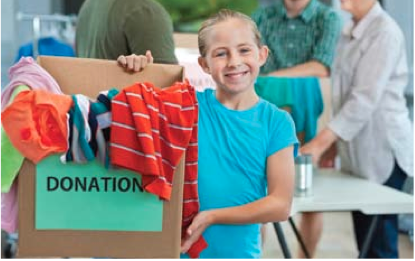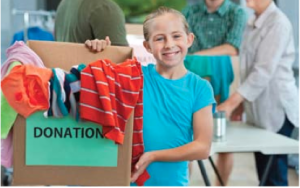

Generosity is a virtue that reaches across cultures and times. Buddha said, “A generous heart…and a life of service…are the things which renew humanity;” while Albert Einstein maintained that “The value of a man resides in what he gives.” Every parent hopes to raise a kind, altruistic, and generous child. Particularly as the holiday season approaches, we all want our children to be just as adept at giving as they are at getting.
Learning to give is an important lesson. Recent research has linked generosity to self- esteem and contentment. Sonja Lyubomirsky, a professor of psychology at the University of California, Riverside, has found that routinely committing acts of kindness leads to greater happiness. In her experimental trials, detailed in the book The How of Happiness (Penguin, 2008), the positive effects on the giver even outweighed the benefits felt by those they were helping.
However, humans are not born hard-wired for generosity. It is a skill that parents need to teach, in the same way you would teach any other valuable skill. First, demonstrate your own altruism. Children, especially young children, will value giving if it is a family habit.
Second, make the practice of giving relevant to the child. For all but the oldest children, donating money, even if from their own allowances, lacks impact. Rather than emphasizing the sacrifice of giving, we need to help children recognize the positive worth of kindness. For example, seeing a child’s smile after receiving a new book imparts more positive feedback about generosity than sending money to a faceless organization in a far off place.
Lastly, make generosity a year round, integral part of your life. Year-round giving will have more of an impact than the once-a- year holiday obligation.
Teach Them Young: Toddlers and Preschoolers
Young children often have enough difficulty sharing toys with a friend, so the path to generosity needs to start small and close to home. Since toddlers and preschoolers yearn for adult attention and approval, the best projects are ones that are done together and gain immediate gratitude. Help the animals in your backyard; make and stock a bird feeder; weave a wreath of yarn for spring birds to use for nest building, hang popcorn strings on evergreens in the winter, and then observe as the animals take the gifts.
If you want to engage in a project on a larger scale, make sure children understand the need for the project. When my son was three, his playgroup gathered spare diapers for a women’s shelter. The drive made a big impact on him only because, having just learned to use the potty, diapers, and other children’s need for them, loomed large in his mind.
Acts of Kindness for the Elementary Aged Child
As children move into the early elementary years, friends take on primary importance. Capitalize on your child’s desire to be a
“good friend” by planning one on one acts of kindness, baking cookies for a neighbor, shoveling snow or weeding the garden of an elderly friend, or helping to cook a meal for a family bringing home a new baby.
Christiane Marshall, a special education teacher, mom, and grandmother, encouraged her children to perform small acts of kindness throughout their childhoods. They performed in nursing homes, tutored friends, and baked bread for neighbors. From her experience, “Moving from the one on one to more indirect giving is a natural step once kids want to help others and get it in their minds that it’s a good thing to do.”
Books About Generosity
Stranger in the Wood
by Carl R. Sams ii and Jean Stoick.
Carl R Sams ii Photography, 1999.
An Orange for Frankie
by Patricia Polacco. Philomel, 2004.
The Rainbow Fish
by Marcus Pfister. North-South books, 1992.
The Giving Tree
by Shel Silverstein. Harper Collins, 1964.
Miss Rumphius
by barbara Cooney. Puffin, 1985.
Places for Children to Volunteer in the Greater Portland Area
Hands on Greater Portland is a clearinghouse for volunteer projects. Their calendar lists age groups suited to each project and the “advanced search” option allows you to find projects for the whole family.
The Children’s Book Bank repairs and donates gently used books to preschoolers. Families can donate books, and older children can volunteer to perform book repairs.
For 81 years, the Oregonian has been publishing a wishbook, called Oregonian’s Season of Sharing, that highlights agencies helping families in Oregon and southwest Washington. Your family’s newest cause might be in the book. The wishbook is available in November in print and online.
Schoolhouse Supplies prepares backpacks stocked with crayons, pencils, paper, and other supplies for children in the greater Portland area and operates a free store where all public school teachers and members of nonprofit organizations in Oregon are invited to pick up classroom supplies. Families can donate items, volunteer in the store, or fill backpacks.


